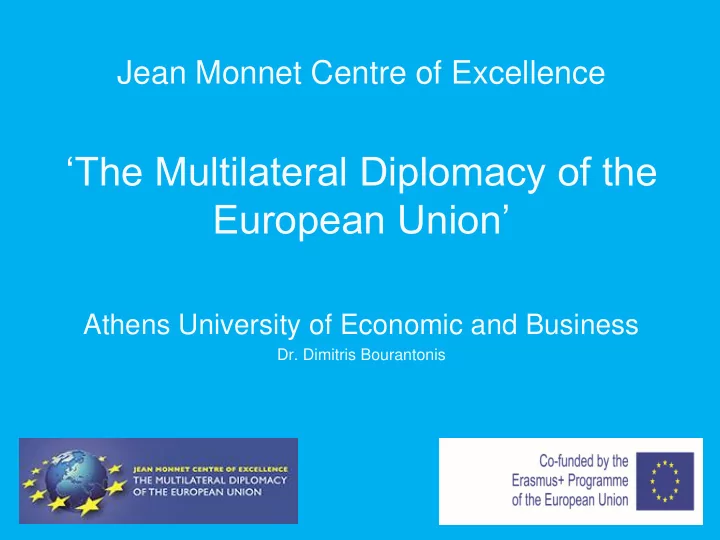

Jean Monnet Centre of Excellence ‘The Multilateral Diplomacy of the European Union’ Athens University of Economic and Business Dr. Dimitris Bourantonis
The Role of the Chair in International Organisations Dimitris Bourantonis (bouranto@aueb.gr ) Professor of International and European Studies
Introduction Chairmanship is an omni-present feature of multilateral fora ◼ in international organisations (IOs) Research Questions to be addressed: ◼ Why Chairs? ➢ Which are the main Functions of the Chair ➢ (holder)? ➢ At what cost the Chair exercises its functions? ➢ What conditions the President’s effectiveness potential? (In other words which are the basic parameters of the Chair’ effectiveness?)
Why Chairs? Chairs are set in place to address collective action problems in multilateral negotiations. ◼ Chairs-agents are expected to: ◼ ensure procedural order, ➢ overcome information asymmetries in political and technical areas of governance and ➢ enhance rule-making efficiency ➢ Functions ◼ agenda management (administrative-procedural and an agenda-shaping component ) ➢ Why agenda management? In order to avoid agenda failure due to The existence of a large number of negotiating parties a. Large number of preferences over the agenda b. Large number of proposals for inclusion in the agenda c. (a) (b) and (c)can lead to conflict over the agenda setting (agenda setting failure) Through compromises and information gained by the Chair the Agenda for negotiations is set up. brokerage (to address tactical information-concealing) ➢ Why brokerage? In order to avoid negotiation failure in the early stage of negotiations parties conceal for tactical reasons their true preferences a. This in turn creates uncertainty over the contract zone or the settlement zone and lead to a situation b. whereby the parties are not able to find out a basis for negotiations. (a) and (b) can lead to negotiations failure Through information gained the Chair submits his/her own negotiating text as a basis for negotiations. He can also submit a new negotiating text to be used as the basis for a final agreement external representation ➢ Why External Representation: As a way to represent the mutliple negotiating parties in their deals with external actors.
At what cost? Assumption of neutrality and impartiality not often hold ◼ Chairs-agents have own preferences and agenda ◼ (they can exploit the chairmanship office for private gains) Discretion zone delineated by control mechanisms ◼ Control mechanisms: ◼ ex ante or ex post ➢ formal or informal (institutional procedures that ➢ provide the formal basis of the agency, and take the form of appointment, administrative and oversight procedures ; prevailing behavioural norms)
Parameters of Chair’s effectiveness Eclectic typology of parameters ◼ Clustered in three broad categories: ◼ the negotiating contour and the content and structure of ➢ the negotiations; organization-specific features of the chairmanship office ➢ and; personal skills and country-of-origin attributes of the Chair ➢ Caveats: ◼ not all are relevant to all institutional settings or cases ➢ parameters interrelated ➢ overlapping ➢
TABLE 1: PARAMETERS OF CHAIR EFFECTIVENESS PARAMETERS OPERATIONALIZATION IMPACT on CHAIR EFFECTIVENESS NEGOTIATING INTERNATIONAL ENVIRONMENT: Systemic Power Configuration Conditions of amity : + / CONTOUR Polarization and enmity: - CONTENT and STRUCTURE of NEGOTIATIONS Nature of Issue: Degree of Salience/Controversy - Negotiation Structure - Decision-Making Rules Unanimity: - ORGANIZATIONAL INSTITUTIONAL ENVIRONMENT FEATURES Design (rotation/ election/ appointment) Process Control/Continuity/Duration of Tenure Operational Rules: Mandate (delineates formal process control) Narrow and Specific Mandate: - Constraints: Formal (control mechanisms) and informal (behavioral norms) Efficient Control Mechanisms: - RESOURCES Informational + Chair Legitimacy and Authority + Political Support by Other Parties + (within/outside negotiations) PERSONAL Personality-specific Features + SKILLS Expertise + Leadership Potential + COUNTRY-OF- Power Reflection ambiguous ORIGIN Country Legitimacy and + ATTRIBUTES Authority
Conclusions Chairs play a significant role in multilateral fora of IOs ◼ The main functions entrusted to the Chair holder are: ◼ Agenda management ➢ Brokerage in negotiations ➢ External Representation ➢ The Chair can exploit its position for private gains. In order to ◼ avoid this perspective control mechanisms are set in place The Chair’s effectiveness depends on a set of interrelated ◼ parameters.
Bibliography Blavoukos, S. and D. Bourantonis (2011) Chairing Multilateral Negotiations: the Case of the United ◼ Nations , London, Routledge. Blavoukos, S., Bourantonis, D. and G. Pagoulatos (2007) ‘A President for the European Union: A ◼ New Actor in Town?’, Journal of Common Market Studies 45 (2): 231-52. Blavoukos, S., Bourantonis, D., and P. Tsakonas, P. (2006) ‘Parameters of the Chairmanship’s ◼ Effectiveness: The Case of the UN Security Council’, The Hague Journal of Diplomacy 1(2): 143-70. Elgström , O. (2006) ‘The Presidency: The Role(s) of the Chair in European Union Negotiations’, The ◼ Hague Journal of Diplomacy 1(2): 171-95. Elgström, O. (ed.) (2003) European Union Council Presidencies: A Comparative Perspective , ◼ London, Routledge. Hayes-Renshaw, F. and. Wallace, H. (2006) The Council of Ministers , London, Macmillan. ◼ Malnes , R. (1995) ‘Leader and Entrepreneur in International Negotiations: A Conceptual Analysis’, ◼ European Journal of International Relations 1(1): 87-112. McCubbins, M. D., Noll, R. G. and. Weingast , B. R (1987) ‘Administrative Procedures as Instruments ◼ of Political Control’, Journal of Law, Economics, and Organization, 3(2): 243-77. Metcalfe, David (1998) Leadership in European Union Negotiations: The Presidency of the Council. ◼ International Negotiation 3 (3): 413-34. Moe, T. and W. Howell (1999) ‘The Presidential Power of Unilateral Action’, Journal of Law, ◼ Economics and Organization 15(1): 132-79. Tallberg , J. (2010) ‘The Power of the Chair: Formal Leadership in International Cooperation’, ◼ International Studies Quarterly 54(2): 241-65. Tallberg, J. (2006a) Leadership and Negotiation in the European Union . Cambridge: Cambridge ◼ University Press. Tallberg , J. (2006b) ‘Formal leadership in Multilateral Negotiations: A Rational Institutionalist Theory’, ◼ The Hague Journal of Diplomacy 1(2): 117-41. Tallberg , J. (2004) ‘The Power of the Presidency: Brokerage, Efficiency and Distribution in EU ◼ Negotiations’, Journal of Common Market Studies , Vol. 42(5): 999 – 1022. ◼ Tallberg , J. (2003) ‘The Agenda - shaping Powers of the EU Council Presidency’, Journal of European ◼ Public Policy 10(1):1 – 19.
Recommend
More recommend